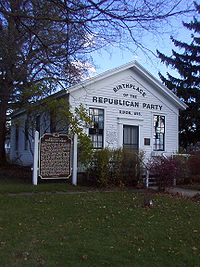Portal:Conservatism/Selected picture/18
In the United States, the Republican Party emerged in 1854, growing out of a coalition of anti-slavery Whigs and Free Soil Democrats who mobilized in opposition to Stephen A. Douglas's January 1854 introduction of the Kansas–Nebraska Act into Congress, a bill which repealed the 1820 Missouri Compromise prohibition on slavery in territory north of the 36° 30′ latitude line, and so was denounced as an aggressive expansionist pro-slavery maneuver by free soil and anti-slavery Northerners.
Two small cities of the Yankee diaspora, Ripon, Wisconsin and Jackson, Michigan, claim to be the birthplace of the Republican Party (in other words, meetings held there were some of the first 1854 anti-Nebraska assemblies to call themselves "Republican"). Ripon held the first county convention on March 20, 1854. Jackson held the first statewide convention on July 6, 1854; it declared their new party opposed to the expansion of slavery into new territories and selected a state-wide slate of candidates.
Credit: Lecter

